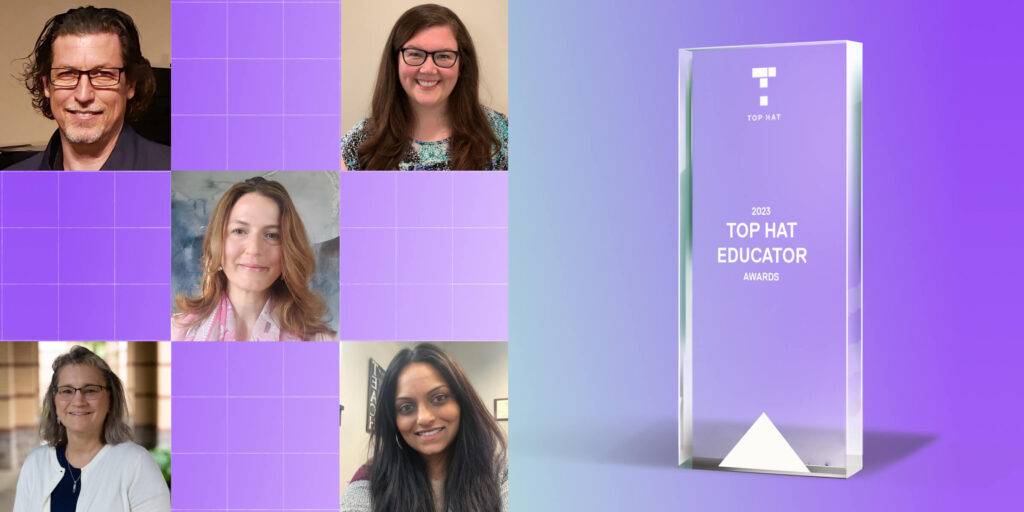Top Hat Engage 2020 has dozens of sessions, organized by three themes: Teaching with Insight, Teaching with Empathy, and Teaching with Experience.
Learning is an organic process—one characterized by collaboration and exploration. It is active and experiential. In the age of automation, it also provides a counterpoint by emphasizing the distinctly human qualities of curiosity, creativity, and collaboration. At the core of this shift is the ability to leverage insight, empathy, and the educator’s own experience to enable every student to realize their potential.
At Engage 2020, we’ll explore these themes in depth, providing clarity, inspiration, and meaningful steps you can take to transform the learning experience for today’s students. Our sessions will also include discussions on how professors are using new tools and approaches to lighten their load and spend more time on what they do best: teaching.
Teaching with Insight
Today’s students are less tolerant of a ‘one-size-fits-all’ approach to their college education. Today’s educators must respond by creating more personalized classrooms, requiring new tools and approaches. To understand what engages students and what they need to be successful, iterative feedback loops become critical in shaping the learning experience, both in the moment and throughout the semester.
Examining this concept, Demian Hommel, professor at Oregon State University, and Andrea Hendricks, professor at University of Alabama at Birmingham, will lead the Small Changes: Lessons from Learning Science session. This panel will demonstrate how making minor adjustments to teaching strategies can positively impact student outcomes. Drawing on personal experience and recent literature, Hommel and Hendricks will share best practices to improve teaching and learning in online and face-to-face learning environments.
In Independent Learning Can Improve Outcomes, Charles Atwood, professor at University of Georgia, Matthew Numer, professor at Dalhousie University, and Steven Forsey, professor at University of Waterloo, will discuss how learning from traditional textbooks alone isn’t effective for most students. All three of these instructors have embraced new approaches to independent learning by creating their own customized textbooks, formative assessments and student-driven learning activities that create iterative feedback loops. After embarking on years of research to prove the impact of their learning designs and materials, they’ll share their results and the secrets of their success.
Teaching with Empathy
Connecting with students and reflecting the diversity of backgrounds and lived experiences within the lecture hall allows for more meaningful and more relevant learning. Rather than trying to fit a widely differing student population into an educational mold, higher education must be more adaptable and more cognizant of differences to meet the needs of today’s evolving student population.
The feeling of belonging is one of the most important factors in determining how successful a student will be in their academic careers. In Pedagogy and Practice That Supports Inclusive Learning Experiences, Natasha Liebig, professor at Adams State University, Eric Davis, professor at Bellevue College, and Derrick Spiva, professor at San Francisco State University, will tackle the topic of inclusivity in the classroom. They will share practical tips on how to ensure students with a diversity of lived experiences and backgrounds thrive, and how classroom technology, online learning and student-centred pedagogies are building more inclusive learning environments.
College populations are growing in diversity, this includes the number of students with a diagnosed or undiagnosed disability. In Reaching Students with Learning Disabilities in a Diverse Student Population, Brittany Joseph, an instructor at Bowling Green State University, will identify strategies attendees can use to increase successful academic outcomes for those with disabilities. This session will help participants better understand the key issues facing diverse student populations and how technology is being used to engage all students inside and outside the classroom.
Teaching with Experience
The power of the modern college educator lies not in their assessments or lecturing skills, but in leveraging active learning strategies that help students understand the bigger picture. Challenge and exploration combined with the judicious application of a professor’s own expertise enables students to develop the critical thinking skills and fortitude to discover the solution for themselves.
While the idea of redesigning a course to incorporate online components can be intimidating, professors implementing a blended learning model find that student success outcomes often exceed those of a traditional classroom setting. In the Blended and Hybrid Learning Workshop, professor Saffieh Mogghadam and Centre for Teaching and Learning Director Karen McCrindle, both at University of Toronto Scarborough, will examine successful blended learning models. Working in small groups, attendees will learn how to leverage face-to-face and online delivery methods to reach a course’s overall objectives.
Collaborative activities like peer instruction and discussion sessions can help students enhance problem solving and critical-thinking skills. The Collaborative Classrooms discussion, led by Olga Glebova, professor at Georgia State University, Alexander Gainer, professor at University of Alberta, and Isaac Wiegman, professor at Texas State University, will shed light on the successes they’ve experienced creating collaborative classrooms. Hear first-hand how they are using in-class technology to improve assessments and build team-based learning environments.
At Top Hat Engage 2020, held in New Orleans from March 5–7, discover how real-time instructional decisions—powered by data— maximize engagement, learning and student outcomes. Get inspired by your academic peers. Learn practical Top Hat tips and tricks that improve your teaching experience and become better equipped to help your students succeed inside and outside of the classroom.


